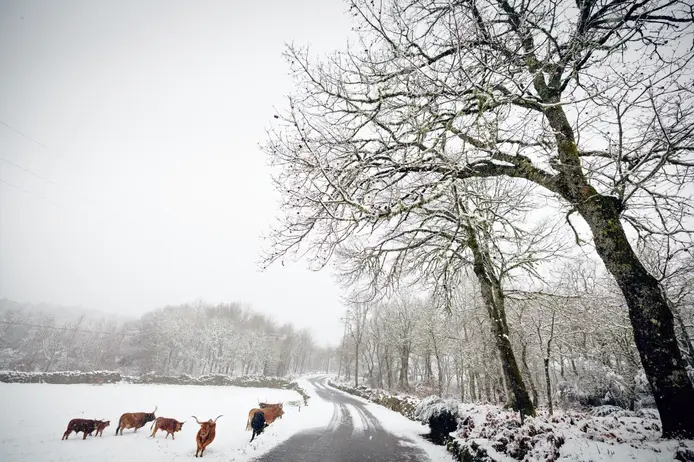Portugal – Death and Dooming
A Romantic Requiem for Forgotten Echoes
Death Doom was never my chosen poison. It rarely caressed my soul the way other sonic expressions might. Yes, there are moments, rare and precious, when a band casts a shadow so thick, so spellbinding, that even my obstinate ears yield and whisper “yes… this is it.” But I am a hard soul to charm. Most offerings drift past me, sound without spirit, technique without torment. Yet, sometimes, something older, something rawer, something born from a time when limitations birthed magic rather than mediocrity, those call to me. Simplicity becomes a sacred language. Grainy recordings hum with ghostly life. And though low fidelity alone is no spell, when it carries the blood of intent and emotion, it becomes alchemy.
In Portugal, during that brief and fertile bloom between 1990 and 1997, Death Doom found its voice, or rather, several voices, each twisted by its own melancholic muse. The waves crashing from the British Isles carried echoes of sorrow, and along our shores, they stirred a storm of creation. Extreme Unction. Agon. Obscenus. Desire. Sculpture. Each a distinct lament. Some bled harshness, others draped themselves in velvet melodies. Some wept with the slow pulse of Doom; others danced with Gothic flair and theatrical Death. But all stood apart, singular flames in our nascent underground.
I do not claim expertise. I stumbled into many of these names by accident, decades late, like uncovering bones beneath the earth, polished by time and myth. One band I did discover early was Paranormal Waltz, a name that still rustles the curtains of memory. And yes, before you raise a purist’s brow, I know they were not Death Doom. They leaned into Atmosphere, into Death Metal, into something undefinable. But labels are prisons. Music, when honest, defies them. Paranormal Waltz had that strange chemistry: layered yet unburdened, melodic without fragility, powerful but precise. Maybe they were Death Metal, maybe not, but their sound cradled traces of Doom’s velvet decay, and that was enough for me.
But it was Agon’s “The Dawn of
Time” that was spinning as I penned these thoughts, a haunting whisper from
1997. A short-lived act, like a flame born to flicker, Agon existed between
1996 and 1998, releasing only a Demo and the split “Trial by Dawn” alongside
Sarcastic and Celestial Dark, two other stars lost to shadow. “The Dawn of Time”
lasts barely thirteen minutes, but within that span lies a vast sorrow, a
cathedral of melancholia. Three songs and a spectral instrumental, each
movement steeped in tragic beauty and mid-paced violence. It does not scream;
it aches. It yearns. Its melodies twist like the bare limbs of autumn trees,
and its keyboards shimmer like tears suspended in air. There is no imitation
here, Agon did not seek to echo Anathema’s golden dusk. Their sound was
theatrical, delicate yet devastating. Death and longing intertwined in a single
breath. A portrait of ruin.
And then there is Sculpture, whose “Like a Dead Flower” may be the closest Portugal ever came to capturing the candlelit magic of Anathema’s “Serenades” or “The Silent Enigma”. But even “inspired” feels too reductive. Sculpture carved their own sorrow. They did not mimic; they bloomed from the same soil but drank from a different stream. This is one of Portugal’s finest Doom elegies, unmistakably 90s in its spirit. Their sound, while reminiscent of Liverpool’s melancholic sons, bears a uniquely Lusitanian soul, sombre, noble, tragic. Bruno’s voice is a black river: deep, slow, aching. At times you could swear it is Anathema, but then the illusion breaks, and you’re left with something more intimate, more rooted. This is not theft; it is kindredness. A pearl of our underground, glimmering in obscurity. I’ve had it on repeat for weeks. My most loyal companion in sound.
Portugal has always given us music of spirit, across all genres. But there was something about then, something about the 90s, that feels… earned. Back then, limitations weren’t chains, they were crucibles. The scarcity of tools forced creativity, pushed musicians to reinvent sorrow with every release. Today, we are drowning in choice, and so many bands sound like echoes of echoes. Originality is a ghost. But I do not mourn it; I have simply turned my ears elsewhere.
To bands like Celestial Dark, who
emerged from Setúbal like a gothic storm. They were not as fragile as Agon, nor
as introspective as Sculpture. They were drama and fire, theatre and ruin. Death
Doom, yes, but embroidered with Gothic textures, symphonic suggestions, and a
pacing that danced on the edge of fury. I do not usually worship at the altar
of Gothic Metal, but Celestial Dark never fell into the genre’s worst sins.
There was no melodramatic excess, no plastic roses, only genuine darkness, and
keyboards that surged like thunder behind ruined castles. Rui’s vocals, growls,
screams, whispers, laments, are the voice of a soul unravelling. And Fátima’s
voice, when it appears, feels like a ghost taking your hand. Perpetual Tears
is a jewel of contrast: aggressive and gentle, cold and warm, structured and
fluid. Doom, yes. Death, certainly. But also… life. Passion. Truth. A requiem
worth revisiting.
These names, Agon, Sculpture, Celestial Dark, are mostly forgotten now. But for those who walked those years, or for those of us who seek the past like treasure hunters in a graveyard, they are sacred. Their music is not nostalgia; it is memory made immortal. They sang of Death but gave us something eternal.
So let the modern scene rush onward. Let it flood and fade. We, the few who still feel the old pulse, will remain here, in the echo chamber of yesteryear, raising broken chalices to the forgotten and the Doomed.
And we will listen. And we will
remember.

Comentários
Enviar um comentário